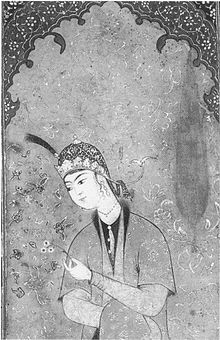Pari Khan Khanum
| Pari Khan Khanum پریخان خانم |
|
|---|---|

Artwork of a seated princess, most likely Pari Khan Khanum.
|
|
| Born | August 1548 Ahar, Iran |
| Died | 12 February 1578 (aged 29) Qazvin, Iran |
| Spouse | Badi-al Zaman Mirza Safavi |
| Dynasty | Safavid |
| Father | Tahmasp I |
| Mother | Sultan-Agha Khanum |
| Religion | Shia Islam |
Pari Khan Khanum (Persian: پریخان خانم, also spelled Parikhan Khanum) was a Safavid princess, the daughter of the Safavid king (shah) Tahmasp I (r. 1524 – 1576) and his Circassian consort, Sultan-Agha Khanum. Pari Khan Khanum was an influential and bright figure in the Safavid state, and was illustrious as an educated woman and was knowledgeable in traditional Islamic sciences, such as jurisprudence. She was also known to be an accomplished poet.
She played an crucial role in securing the succession of her brother Ismail II (r. 1576–77) to the Safavid throne. However, during Ismail's brief reign, her influence lessened. During the reign of Ismail's successor, Mohammad Khodabanda (r. 1578–1587), she regained her influence, and became the de facto ruler of the Safavid state for a short period. She was strangled to death on 12 February 1578 at Qazvin, due to being viewed as too dangerous with the amount of influence and power she held.
Pari Khan Khanum was born as the second daughter of the Safavid shah Tahmasp I by his Circassian wife Sultan-Agha Khanum in August 1548 at Ahar. When Tahmasp's brother Bahram Mirza Safavi died in 1549, he took care of the latter's children, even announcing prince Badi-al Zaman Mirza Safavi as his own son. He appointed him as the governor of Sistan in 1557, and offered him Pari Khan Khanum (who was at that time 10 years old) as a wife, which he accepted. However, since she was Tahmasp's favored daughter, she was not allowed to go alongside her husband to Sistan.
According to the other historians, however, Pari Khan Khanum was only engaged to Badi al-Zaman, which according to Gholsorkhi seems more believable. Allegedly the marriage went no farther, since Pari Khan Khanum chose a bureaucratic life in the capital, alongside her father, over married life in Sistan.
...
Wikipedia
